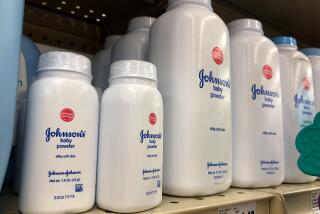Tobacco Firms Not Culpable for Death, Jury Rules
- Share via
Tobacco companies got a break late Friday as an Indiana jury found four cigarette makers were not responsible for a longtime smoker’s cancer death, a case viewed as a key test for an industry battered by litigation and brand-new federal regulations.
The verdict comes on the heels of a similar lawsuit, which the industry lost two weeks ago, and trailed by only hours the signing by President Clinton of legislation that places new restrictions on the sale and advertising of cigarettes.
After 16 hours of deliberation, a Superior Court jury rejected the claims by Yvonne Rogers that four tobacco companies sold products that were defective to her husband, Richard.
The liability suit charged that the four--R.J. Reynolds Tobacco Co., Liggett Group Inc., Philip Morris Inc. and the American Tobacco Co., now owned by Brown & Williamson Tobacco Corp.--were negligent and contributed to Rogers’ death. The suit sought at least $424,000 for Rogers’ lost earnings and medical expenses.
In a post-verdict news conference, the six jury members explained that their decision was based on Rogers’ freedom of choice and personal responsibility.
The Rogers suit was widely watched because it was followed a stunning breakthrough in the decades-long legal assault on the tobacco industry. On Aug. 9, a jury in Florida awarded a lung cancer victim $750,000 in damages from Brown & Williamson.
That marked the industry’s first real loss in more than four decades of cigarette litigation. The case, which involved a retired air traffic controller named Grady Carter, shattered a record of which the tobacco industry was proud: that despite hundreds of suits filed since the mid-1950s, not a dime had been paid in damages.
In closing arguments in the Rogers case, plaintiff’s attorney Warren Holland told jurors that Richard Rogers, who began experimenting with cigarettes when he was only 5 years old, was addicted to cigarettes even before the 1964 Surgeon General’s warning, and that tobacco companies were aware all along that their product was “unreasonably dangerous.”
Holland also said the companies should be held responsible for making cigarettes addictive. “This is not just a habit.”
But the tobacco companies said Rogers had continued to smoke willingly, despite a public perception of dangers heightened by the Surgeon General’s report and then by cigarette warning labels.
In the Florida case, lawyers were able to introduce tobacco company documents linking nicotine and addiction, but these records were barred from the Rogers case because it was a retrial and the judge limited evidence to that introduced the first time. The earlier trial ended with a mistrial when the jury couldn’t decide if Rogers smoked voluntarily.
Before the Florida case, only one other damage award was returned against tobacco makers, a 1988 award of $400,000 to the family of Rose Cipollone of New Jersey. That verdict was overturned on appeal and the lawsuit later was dropped.
Tobacco industry stocks were battered in the wake of the Carter verdict and have not fully recovered since. Tobacco industry analyst John C. Maxwell Jr. expects tobacco stocks to move higher on Monday in reaction.
“It’s obviously a great victory for the companies and a lot of people were worried they might lose this one,” said Maxwell, an analyst with Wheat First Securities.
Yvonne Rogers left after the verdict without commenting. Attorney Holland said the family is disappointed but that “we don’t want people to give up. It’s just another chapter; this is not the end.”
The tobacco companies issued statements applauding the verdict.
Charles R. Wall, senior vice president for litigation at Philip Morris, called Friday’s verdict “our most important victory to date dealing with the purported ‘addictive’ qualities of cigarettes because some members of the plaintiff’s bar claimed it was an ideal case.”
Brown & Williamson predicted that the result of the Rogers trial is “strong proof” that an appellate court will reverse the jury verdict in the Carter case.
But Richard Daynard, head of the Tobacco Products Liability Project, which encourages tobacco lawsuits, said he doesn’t expect the Rogers verdict to dissuade others from filing similar lawsuits.
“As in all litigation, if you’ve got a good case, bring it,” Daynard said. “At this point, the plaintiffs are batting 500.”
* Times wire services contributed to this report.
MAIN STORY: A1
More to Read
Inside the business of entertainment
The Wide Shot brings you news, analysis and insights on everything from streaming wars to production — and what it all means for the future.
You may occasionally receive promotional content from the Los Angeles Times.










